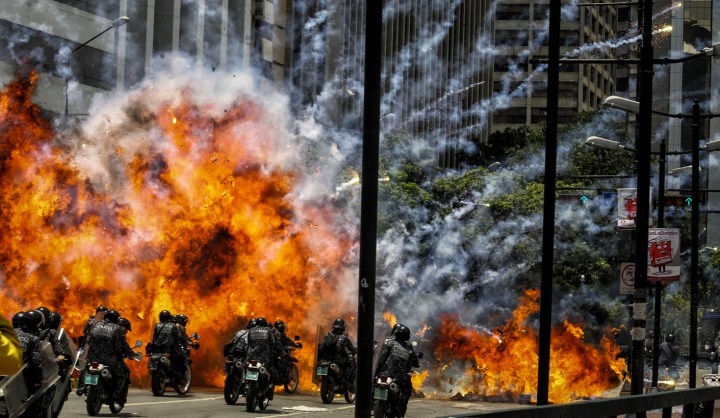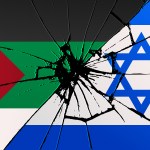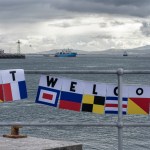World
Op-Ed: Dictatorship, violent overthrow or civil unrest? The portents are grim for Venezuela’s future

These days, the news coming out of Venezuela is all bad. The economy is in free-fall, daily rolling protests are rocking the country, people are being beaten, arrested and killed by the hundred, and thousands are fleeing the country in desperation. How did it come to this? By JOHN ENDRES.
How did this Caribbean nation, once renowned for its beauty pageant winners, vast oil wealth and tropical splendour, turn into a hellhole from which people are desperate to escape at any cost?
The reasons lie in the economic and governance model introduced by the late president, Hugo Chávez, known as “21st century socialism”. The model was premised on spending petrodollars freely in an attempt to create an equal society where everybody enjoyed free healthcare and education, as well as heavily subsidised food, transport and housing. In doing so, Chávez invented nothing new – he was continuing a Venezuelan tradition that had existed for decades prior, while relabelling it as a socialist venture.
Not long ago, the global Left was singing the praises of this model. The branding exercise was successful, as progressives around the world swooned in admiration of Chávez’s genius. Actor Sean Penn described him as “a friend I was blessed to have”; film director Oliver Stone described him as “a great hero to the majority of his people”.
UK opposition leader Jeremy Corbyn said: “Chávez showed us that there is a different and a better way of doing things. It’s called socialism, it’s called social justice and it’s something that Venezuela has made a big step towards.”
And our very own Julius Malema added: “Despite massive resistance from rented imperialist puppets, President Hugo Chávez was able to lead Venezuela into an era where the wealth of Venezuela, particularly oil, was returned to the ownership of the people as a whole. […] Under President Chávez, the standard of education and health in Venezuela has radically improved and stabilised with guaranteed access for all people of Venezuela to quality free education and healthcare.”
At the time these accolades were so freely given, Venezuela was a frequently cited role model. Chávez’s admirers could have added that the government’s beneficence did not end at spending oil money. To keep groceries and other goods affordable for the people, it also capped the prices of thousands of goods. To ensure that the foreign exchange streaming into the country was managed responsibly, it operated strict exchange controls, with a variety of official exchange rates, allocating funds to where it thought they were really needed. To protect the people from capitalist depredations, the government expropriated a large number of farms and companies, putting the means of production into the hands of the people. All of these were textbook measures from the interventionist or developmental state playbook.
Today, however, the dream lies in tatters, and progressives have gone quiet.
President Chávez’s successor, Nicolás Maduro, has presided over one of the most extreme economic collapses of any country in peacetime. Venezuela’s inflation rate is running at well over 100%, and the country has officially joined the short list of countries to have experienced hyperinflation (it is the 57th country to join the Hanke-Krus Hyperinflation Table, which lists all countries to have experienced a period where inflation exceeded 50% for 30 consecutive days).
Some apologists blame the Maduro mess on external factors, primarily the volatile price of oil. In 1999, when Chávez took power, oil cost about $40 per barrel. The price rose during his period of office and remained resolutely above $80 from August 2005 until October 2014 (with only a few brief dips below $80). The result was an unprecedented flood of revenue that kept the state afloat while its productive capacity was systematically destroyed. When the oil price started dropping from its August 2014 level of $100 per barrel, the fatal flaws of 21st century socialism became glaringly obvious. Since 2015, the price has been stuck below $50, with only a few short-lived sallies above that price line.
To make matters worse, Venezuela’s oil production has been steadily declining since 2007, for reasons that are entirely home-made. In 2003, Chávez summarily fired almost 20,000 employees of the (at the time) respected and efficient state oil company, PDVSA. In 2007, the Chávez government demanded majority control of projects managed by international oil companies. Total, Chevron, Statoil and BP acquiesced; ExxonMobil and ConocoPhillips refused and their assets were expropriated (in both expropriation cases, a World Bank arbitration panel ruled against Venezuela; the country continues to appeal the decisions).
The sum effect of the 2003 and 2007 changes was an overwhelming exodus of local and international experience and expertise from the oil sector, which helps to explain the third reason for the decline: PDVSA neglected to re-invest revenues in production and refining capacity, instead handing over the funds to the government for its social programmes. As a result, industrial accidents multiplied and production dropped, from a peak of 3.5-million barrels per day in 1998, to below 2-million barrels per day in 2017. Not surprisingly, Venezuela is one of the most vociferous advocates of production cuts in OPEC – it desperately needs the oil price to rise.
In summary, the Chávez and Maduro administrations were delinquent in preparing the country for a period of low oil prices, and culpable in presiding over a period of declining output and investment.
But their responsibility for the current catastrophe extends far beyond just the oil sector. After all, surely Venezuela – a large, fertile country blessed with a long coastline, plentiful rain, great rivers, abundant wildlife, rich mineral and petrochemical endowments, and a creative and resourceful people – should be able to produce whatever it needs. The reasons why it doesn’t lie squarely with the misguided economic policies of Venezuelan-style 21st century socialism.
For example, the caring administrations of Chávez and Maduro wanted to make sure that goods remained affordable for ordinary people. What could be more obvious than decreeing prices for all types of goods? Things should not be too expensive, so logically it would be irresponsible to leave it to profit-maximising capitalists to set prices however they wanted.
Any first-year economics student could spot the flaw in the thinking. When the government sets the maximum price too high, it is irrelevant – businesspeople are already selling below that price in any case. But if the government sets the maximum price too low, the risk is that manufacturers stop producing because they cannot earn enough money (or indeed, are going to incur losses). And this is exactly what happened in Venezuela.
Hundreds of businesses closed down because the price at which they were allowed to sell their product was lower than the cost of making it, so there was no point in continuing. (As an aside, some businesses tried to get away with selling at a “higher than legal” price, thereby creating a black market; but the inspectors of the state revenue authority, SENIAT, checked prices and closed down any business they found violating the pricing regulations.)
Artificially low prices had another effect: they created artificially high demand. When things are cheaper than expected, people want to buy more of them than they would otherwise. Venezuela’s petrol prices are a good example: the petrol price is heavily subsidised, so much so that a tankful of petrol costs no more than a dollar or two. Ironically, this has led to petrol shortages, especially in the border regions: it makes more sense to buy cheap petrol and smuggle it across the border than actually use it.
Price controls thereby both curtailed supply and inflated demand. This is one of the main reasons for the extreme shortages in all types of goods reported from Venezuela over the past few years. People have joked about the fact that the country with the world’s largest oil reserves has run out of toilet paper, but for millions of Venezuelans the shortages are deadly serious.
Even necessities like medicines, maize flour (used for making arepas, Venezuelan flatbread), cooking oil, milk, sugar, vegetables and chicken are hard or impossible to come by. Venezuelans either have to queue for hours in the hope of getting something (often it is not clear what), or turn to the black market if they can afford to.
According to a national survey of living conditions, three-quarters of Venezuelans said they lost 8kg of weight in 2016 alone. According to surveys by Caritas, a Catholic welfare organisation, 11.4% of children under five are suffering from moderate or acute malnutrition (the World Health Organisation’s crisis threshold for child nutrition is 10%). Nearly six out of 10 households surveyed reported some family members going without food so that another person in the family could eat.
Students of economic history know that these consequences were predictable, as the same thing has happened every time price controls have been introduced, going back to Diocletian’s Edict on Maximum Prices of 301 and probably before.
Another reason why production collapsed in Venezuela is that property rights were progressively undermined and shown to be worthless. Chávez became famous for saying “¡Exprópriese!” (expropriate it!) about buildings, companies, farms and other assets during his rambling television shows, which all channels were required by law to broadcast live. Almost anything could be expropriated at the president’s whim.
Under those circumstances, which investor in her right mind would put money into real estate, plant and equipment or a business venture? Simultaneously, and as was to be expected, expropriated assets – be they farms, steel companies, cement factories or other manufacturing organisations – quickly became unproductive and rundown. The country’s productive capacity was thereby rapidly destroyed, without alternatives being put in place. This is a lesson parties like the Economic Freedom Fighters would do well to heed: the first two of their seven “non-negotiable” pillars proposes precisely that. If implemented, the consequences would be exactly the same as in Venezuela.
In Venezuela, the toxic effects of these policies were hidden while oil prices were high. The country could simply import whatever it needed. Government feeding schemes and subsidies benefited the poor, even though the state’s food parcels were often of poor quality.
But once oil income slowed to a dribble, the country ran out of options. It could no longer produce what it needed, nor could it import its necessities. Concerns about the country’s macroeconomic and political environment meant that credit funding, too, was no longer easily available – although the country is recognised for exhibiting a high willingness to service its debt, even at the cost of painful expenditure cuts.
Beginning in early 2017, Venezuela erupted into protests once again. In contrast to previous occasions, however, the current wave of protest shows no signs of subsiding. Venezuelans have reached a breaking point. They know that their situation will not improve while the current government is still in charge.
Their frustration is fed by the fact that the government has subverted and sabotaged mechanisms of accountability and democratic expression at every turn. After the opposition won the 2015 parliamentary elections by a landslide, obtaining 109 seats to the government alliance’s 55, the Maduro regime used every conceivable trick to prevent the opposition-dominated assembly from changing the country’s socialist path.
Maduro used the outgoing assembly to pack the TSJ – the Supreme Tribunal of Justice, Venezuela’s highest court – with allies. From December 2015 onwards, the TSJ used its powers to overturn every law passed by parliament. In February 2017, a new head of the TSJ was appointed: Maikel Moreno, a former member of the secret police and convicted murderer who spent two years in prison for having killed a woman in 1987.
In early 2016, the TSJ alleged that there had been voting irregularities in the 2015 elections and stripped four opposition lawmakers of their seats, thereby depriving the opposition of the supermajority it needed to challenge Maduro. In October 2016, the government-controlled national electoral council abruptly cancelled a recall referendum against Maduro which the opposition had been pursuing for the preceding five months, allegedly because of “voter fraud”. In March 2017, the TSJ stripped opposition MPs of their parliamentary immunity and assumed legislative powers of the National Assembly (the TSJ partially reversed its decision some days later).
With all formal democratic avenues of pursuing change closed down, the street was the only option remaining. Since April, massive, daily protests have roiled the country. The government has become increasingly heavy-handed in its repression. Apart from being attacked with water cannons and tear gas, protesters risk being shot at point-blank range with tear gas canisters, which has already led to some deaths; they risk being run over by armoured vehicles, being assaulted, beaten and arrested, being sentenced by military tribunals, and being harassed and hounded in innumerable other ways.
Against this backdrop, Maduro has proposed rewriting the constitution, no doubt with the aim of removing restrictions on executive action (especially from the pesky National Assembly, which the constituent assembly would have the power to dissolve), extending his own time in office, and strengthening his “21st century” type of socialism.
On Sunday, 30 July, voters are called upon to elect 545 members of a “Constituent Assembly” that will rework the constitution. Remarkably, 173 of the members have to be elected in specific proportions from specified “sectors”, in keeping with the class-based view of society: five businesspeople, eight farmers or fishers, five persons with disabilities, 24 students, 79 workers, 24 representatives of communes and communal councils, and 28 pensioners. The remainder are to be elected in local polls, based on regions gerrymandered to ensure a favourable outcome for the government.
As the opposition does not expect the election of the members of the constituent assembly to be free and fair, it organised an unofficial ballot on 16 July. The poll registered over seven million votes opposing Maduro’s constitutional reform process and calling for elections to be held. Considering that the poll was organised at two weeks’ notice and without any large-scale financial support or public infrastructure, the fact that the opposition was able to mobilise over a third of the country’s voters is an impressive feat. Since then the protests, marches and strikes have only increased.
What is clear is that the country’s deepening economic crisis cannot be resolved in the absence of a substantive political change. The Maduro government lacks the credibility, ability or motivation to introduce policies that could conceivably lead to an improvement in the country’s fortunes. Nevertheless, it has become clear that Maduro will do everything in his power to remain in control – presaging ongoing violence, repression and economic decline for Venezuela.
The three most likely scenarios for Venezuela’s future are: the imposition of a more totalitarian and repressive dictatorship along communist principles, similar to Cuba; the violent overthrow of the Maduro government, followed by significant civil unrest and steep economic decline; or some sort of negotiated settlement that sees Maduro exiting office and an opposition-led government of national unity taking over. Unfortunately, none of these scenarios promises quick relief for suffering Venezuelans; but the first scenario is the worst of the lot, as it would prolong Venezuela’s agony the most. DM
John Endres is a policy fellow at the IRR, a think-tank that promotes political and economic freedom.
Photo: Bolivarian National Police (PNB) agent was wounded in an explosion in the street near motorized police in the vicinity of the Altamira Square, in Caracas, Venezuela, 30 July 2017. Clashes are breaking out as the voting on a constituent assembly takes place under strict security measures and despite the rejection of local opposition and the international community. The new assembly would have powers to rewrite a constitution and bypass the National Assembly which is currently controlled by the opposition. EPA/MIGUEL GUTIERREZ


















